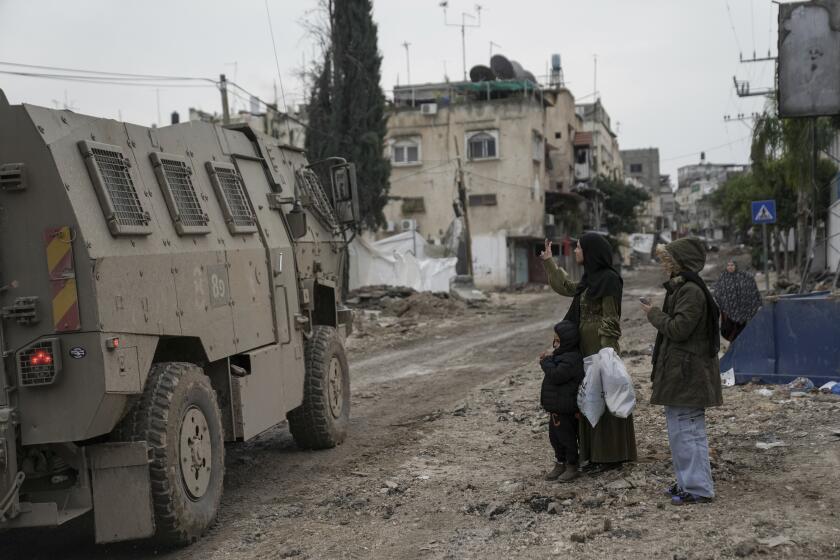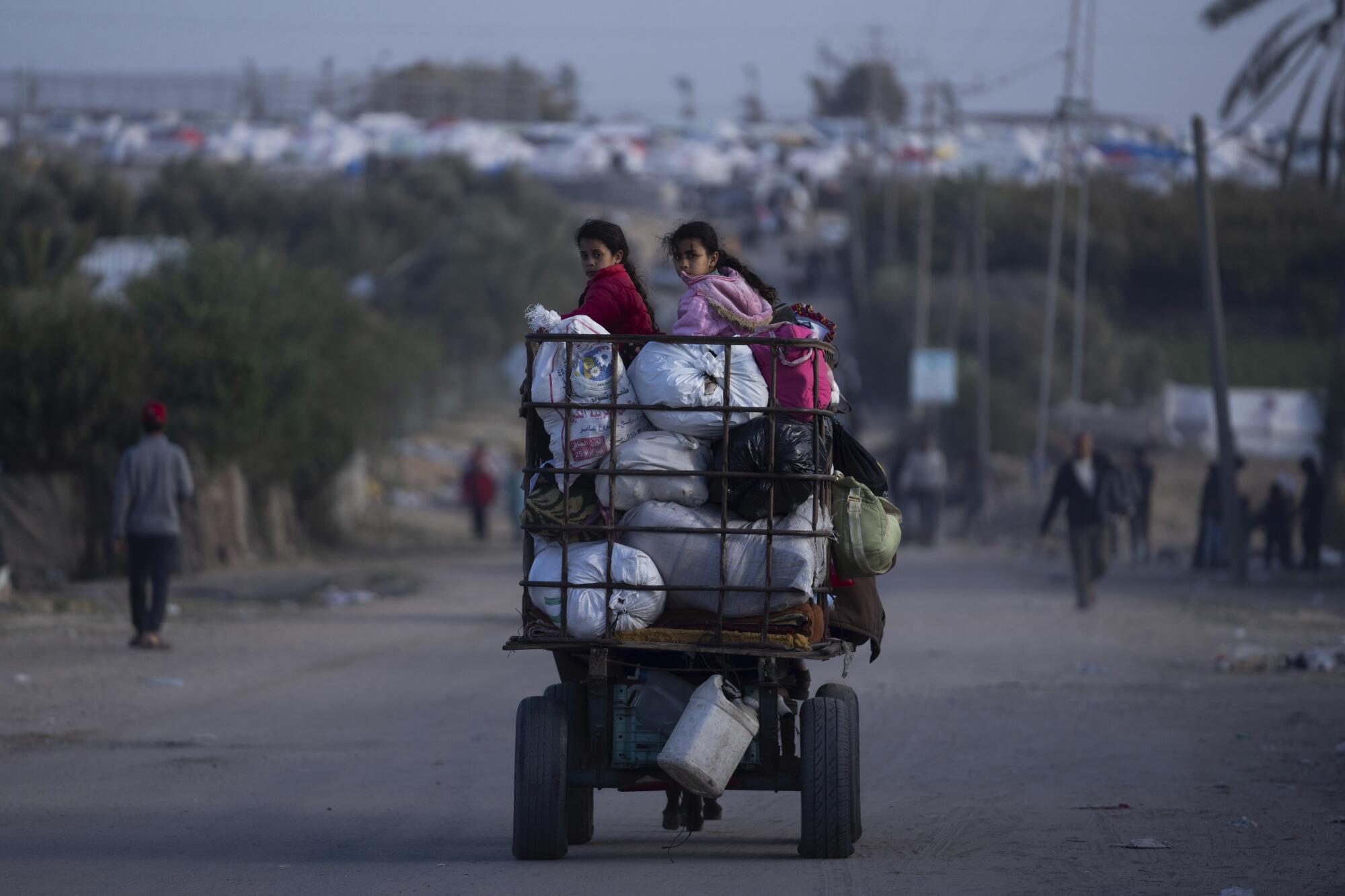
- Share via
JERUSALEM — Palestinian militants carried out the deadliest single attack on Israeli forces since the start of the war in Gaza, killing 21 soldiers, the military said Tuesday, a significant setback that could add to mounting calls for a cease-fire.
Hours later, the Israeli military announced that ground forces had encircled the southern city of Khan Yunis, Gaza’s second-largest. That marked a major advance, but it was unclear how much closer it would bring Israel to defeating the militant group Hamas or freeing Israeli hostages — two central war aims that have proved increasingly elusive — as cease-fire talks appear to be gathering pace.
Israeli Prime Minister Benjamin Netanyahu mourned the soldiers, who died when the blast from a rocket-propelled grenade triggered explosives they were laying. But he vowed to press ahead until “absolute victory,” even as Israelis are increasingly divided over whether it’s possible to both crush Hamas and free scores of captives.
A senior Egyptian official said Israel had proposed a two-month cease-fire in which the hostages would be freed in exchange for the release of Palestinians imprisoned by Israel and top Hamas leaders in the Gaza Strip would be allowed to relocate to other countries.
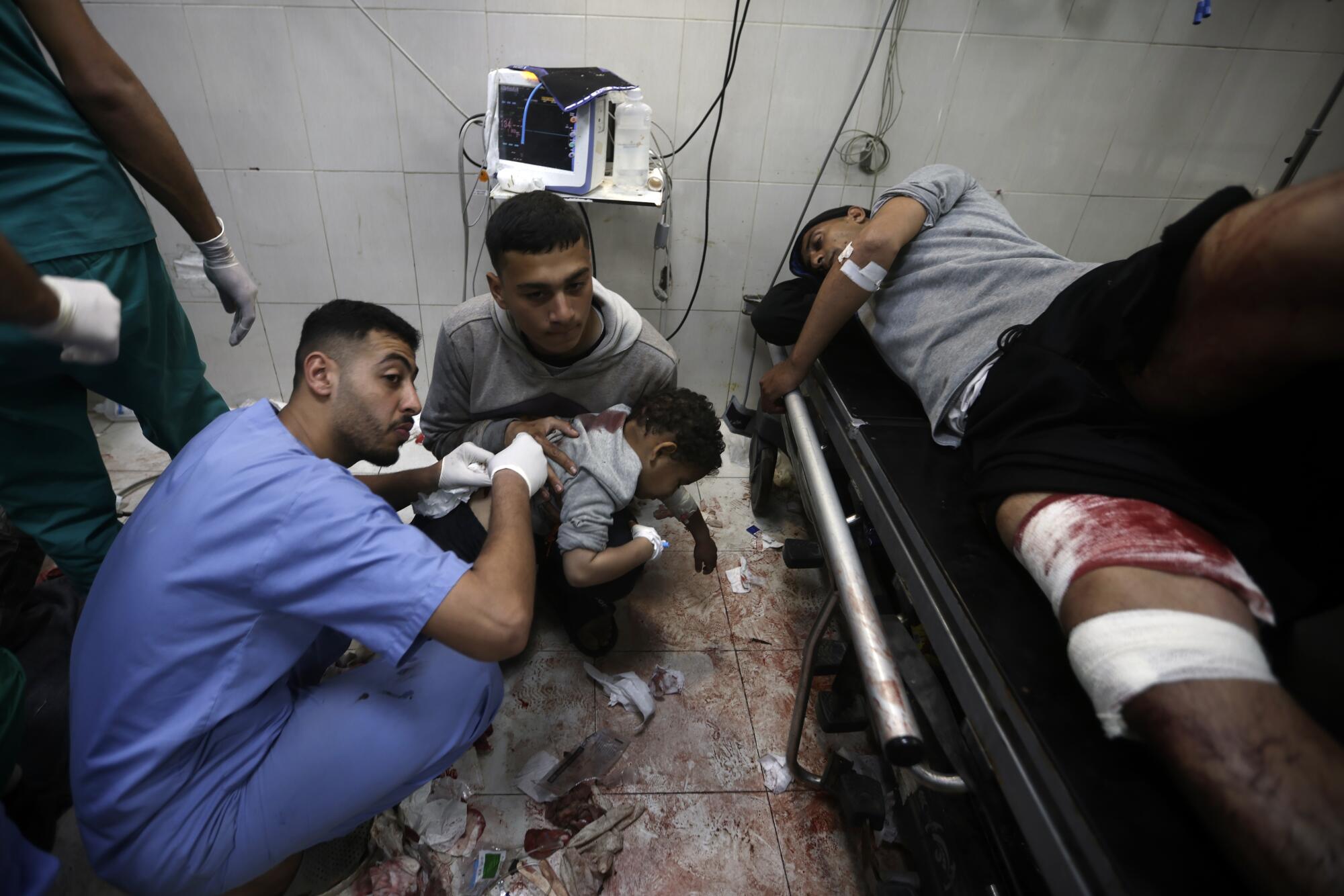
The official, who was not authorized to brief media and spoke on condition of anonymity, said Hamas rejected the proposal and was insisting that no more hostages would be released until Israel ended its offensive and withdrew from Gaza. Israel’s government declined to comment on the talks.
Egypt and Qatar, which have brokered past agreements between Israel and Hamas, were developing a multi-stage proposal to try to bridge the gaps, the official said. Families of the hostages have called for Israel to reach a deal with Hamas, saying time is running out to bring their relatives home alive.
The war in Gaza has shattered the territory’s fragile mental health services — at a time when people need them most.
Israel launched its offensive after Hamas militants crossed the border into southern Israel on Oct. 7, killed at least 1,200 people and took about 250 others hostage. More than 100 abductees were released in November during a weeklong cease-fire.
The offensive has caused widespread death and destruction in Gaza, displaced an estimated 85% of the population of 2.3 million and left a quarter facing starvation. Iran-backed groups in Lebanon, Syria, Iraq and Yemen have meanwhile attacked American and Israeli targets in support of Palestinians.
The U.S. and Britain launched another wave of strikes Monday against Yemen’s Houthi rebels, who have targeted international shipping in the Red Sea. Lebanon’s Hezbollah group said it fired rockets at a strategic military installation in northern Israel for a second time this month.
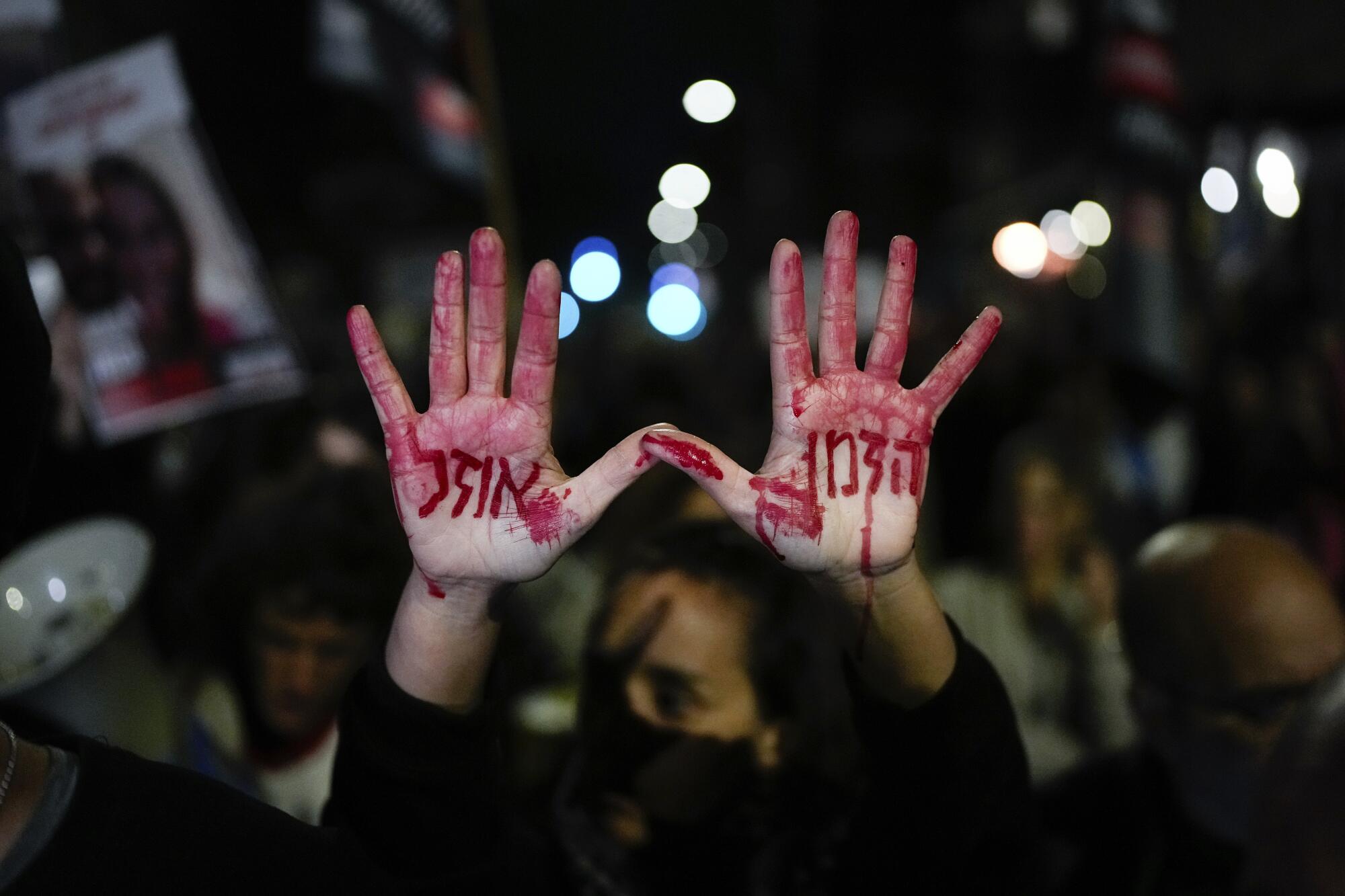
Israeli reservists were preparing explosives to demolish two buildings near the built-up Maghazi refugee camp in central Gaza on Monday when a militant fired a rocket-propelled grenade at a nearby tank. The blast triggered the explosives, causing both two-story buildings to collapse on the soldiers.
At least 217 soldiers have been killed since the ground offensive began in late October, including three in a separate event Monday, according to the military.
Netanyahu acknowledged that it was “one of the hardest days” for Israel since the war began but vowed to keep up the offensive.
Saudi Arabia’s top diplomat says the kingdom will not normalize relations with Israel without a credible pathway to a Palestinian state.
“We are in the middle of a war that is more than justified. In this war, we are making big achievements, like the encircling of Khan Yunis, and there are also very heavy losses,” he later said in a video statement.
Gaza’s Health Ministry said Tuesday that the bodies of 195 people killed in Israeli bombardments were brought to hospitals in the previous 24 hours. Hospitals also received 354 wounded, it said.
The fatalities brought the death toll in the strip to 25,490 since the war began, the ministry said. An additional 63,354 were wounded, it added. The Health Ministry’s count does not differentiate between civilians and combatants.
Israel claims to have killed thousands of militants and to have largely defeated Hamas in northern Gaza in operations that caused widespread destruction to that part of the territory, including Gaza City. In recent weeks the offensive has focused on Khan Yunis and refugee camps in central Gaza, including Maghazi, that date to the 1948 war surrounding Israel’s creation.
Start your day right
Sign up for Essential California for the L.A. Times biggest news, features and recommendations in your inbox six days a week.
You may occasionally receive promotional content from the Los Angeles Times.
The military said its forces had killed dozens of militants in Khan Yunis in recent days and had encircled the city, without providing evidence. It was not possible to independently confirm those claims.
Raed Nems, a spokesperson for the Palestine Red Crescent rescue service, said there was heavy fighting around the city’s Al Amal Hospital. He said a shell had hit the fourth floor, killing one person and wounding 10 others. Medical teams were unable to enter or exit the hospital, and a territory-wide communication outage further complicated rescue efforts, he said.
Thousands of people fled Khan Yunis on Tuesday, some on foot with only what they could carry. Thick black smoke could be seen rising over the city.
“We heard very intense shelling, and we couldn’t sleep all night because we were so afraid,” Ibtisam Abu Jommaiza said as she made her way out of the city.
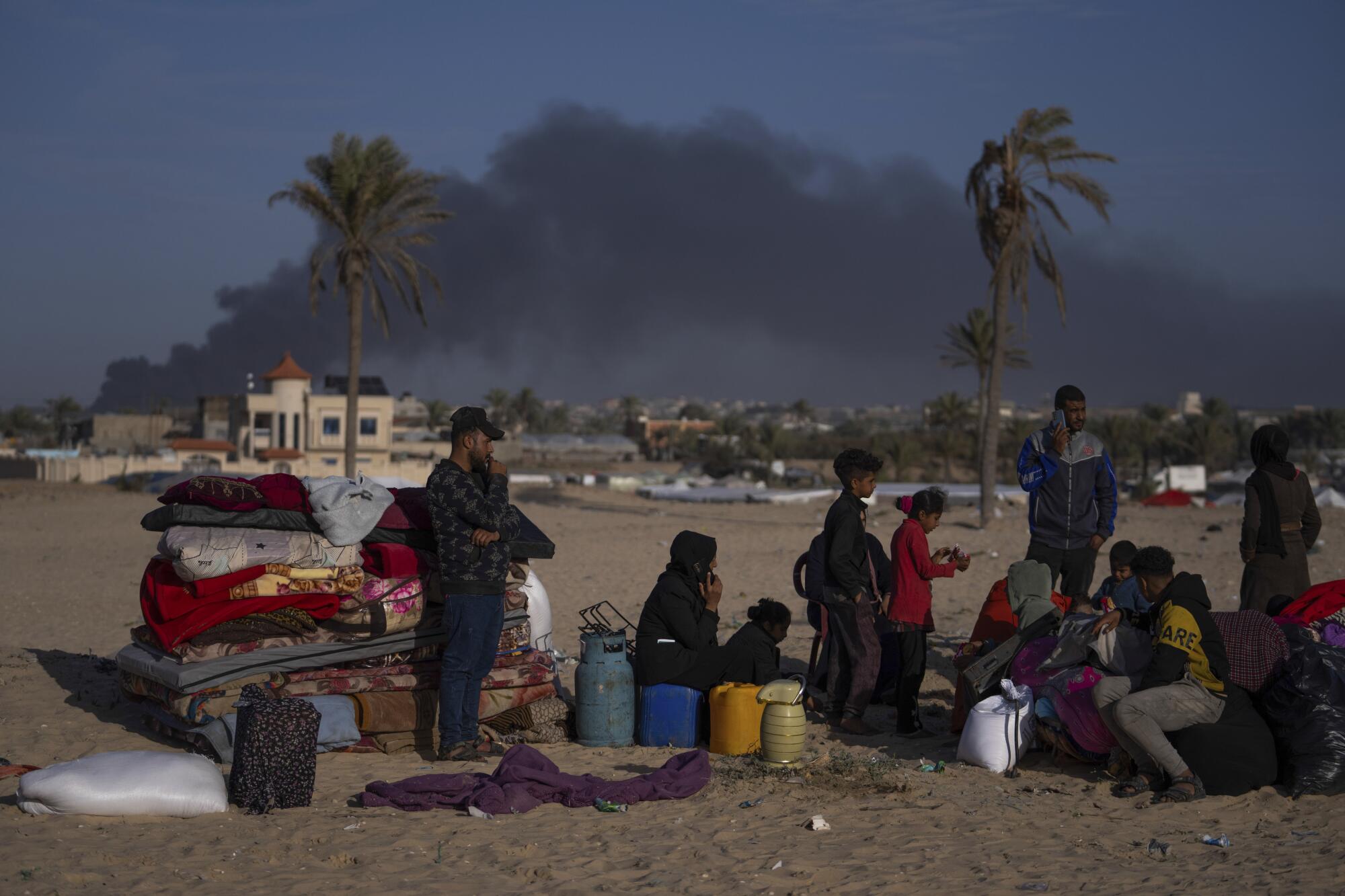
Israel believes Hamas commanders may be hiding in vast tunnel complexes beneath Khan Yunis, the hometown of the militant group’s top leader in Gaza, Yahya Sinwar, whose location is unknown. Hamas leaders are also believed to be using hostages as human shields, further complicating any rescue efforts.
The growing death toll and dire humanitarian situation have led to increasing international pressure on Israel to scale back the offensive and agree to a path for the creation of a Palestinian state after the war. The U.S., which has provided crucial military aid for the offensive, has joined those calls.
But Netanyahu, whose popularity has plummeted since Oct. 7 and whose governing coalition is beholden to far-right parties, has rebuffed both demands.
Opinions on how to handle the war against Hamas in the Gaza Strip are emerging among senior Israeli officials as the fighting drags on in the enclave.
Instead, he has said Israel will need to expand operations and eventually take over the Gaza side of the border with Egypt — an area where hundreds of thousands of Palestinians who have fled other areas are packed into overflowing United Nations-run shelters and sprawling tent camps.
That drew an angry protest from Egypt’s government, which rejected Israeli allegations that Hamas smuggles in weapons across the strip’s heavily guarded southern frontier.
Diaa Rashwan, head of Egypt’s State Information Service, said Monday that any Israeli move to occupy the border area would “lead to a serious threat” to relations between the two countries, which signed a landmark peace treaty more than four decades ago. Egypt is also deeply concerned about any potential influx of Palestinian refugees into its Sinai Peninsula.
More to Read
Sign up for Essential California
The most important California stories and recommendations in your inbox every morning.
You may occasionally receive promotional content from the Los Angeles Times.


